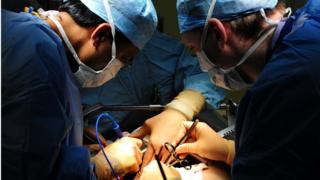NHS waiting lists surge due to pensions row
 Image copyright PA Media
Image copyright PA Media Waiting lists for routine surgery have risen by up to 50% in England because senior doctors say they cannot afford to work extra shifts.
Consultants have begun refusing to work beyond their planned hours after receiving unexpected tax bills, following new pension rules in 2016.
NHS hospitals said delays are becoming increasingly routine as a result.
The Department of Health said it aimed to solve the problem with more flexible pensions.
Consultants who earn more than £110,000 a year faced new limits on how much they could contribute to their pension from 2016. Complex rules mean the charges can be unpredictable if they go over the allowance.
But those near the threshold have few options to avoid the impact, other than reducing their hours, quitting the NHS pension scheme or taking early retirement.
Analysis
By BBC Health Editor Hugh Pym
There may not be a lot of sympathy for well paid consultants having to pay higher tax bills. But if the net result is a punishing tax hit for the doctors when they work extra hours its easy to understand why they are reluctant to do more than their normal full, and often stressful, week’s work.
The Government is consulting on plans to make the system more flexible, allowing doctors to reduce their pension contributions. But NHS Providers, representing trusts, says clinicians have lost faith in this process. If there is no solution very soon, says the organisation, patients will have to endure longer waits and more frustration.
How does the system work?
The government gives tax relief on contributions to pension schemes, and allows up to 25% of the benefits to be taken tax-free at retirement.
Since 2006, there have been limits on the amount that can be contributed each year and the total benefit that can be built up over a career.
If the growth in a doctor’s pension scheme exceeds this annual allowance they face a charge, or a reduction in their pension benefits.
The limit on the annual allowance has come down from £255,000 a year in 2010-11, to £40,000 a year for those earning broadly less than £110,000 in 2018-19.
In addition, a tapered annual allowance was introduced in 2016 for higher earners. This means that the annual allowance is reduced by £1 for every £2 earned, says the British Medical Association (BMA).
It says a major problem for doctors is that all their income is taken into account when calculating their annual allowance, including work that is non-pensionable. In addition, the annual allowance is based not just on their annual income, but also on the growth in their pension pot.
Because of the way the allowance is calculated many consultants will face a significant tax bill even if their earnings are only just above £110,000 a year.
NHS Providers, which represents hospital trusts, said senior staff were now saying they could not afford to work at weekends to bring waiting lists down.
A senior anaesthetist at one hospital worked 27 Saturdays last year to reduce waiting times but now cannot afford to, the organisation said.
Another hospital has seen numbers waiting for routine surgery increase by 50% since April, with staffing issues due to the pensions problem partly to blame.
The Guardian reported that the Royal Bournemouth Hospital has 53 sessions of surgery and 150 procedures uncovered between now and 27 July because no consultant anaesthetists are available.
NHS Providers said a solution is needed urgently and the government is moving too slowly.
Data for April show the percentage of patients treated within 18 weeks is the lowest since current records began at 86.5%. The total waiting list for operations was nearly 4.3 million.
The Department of Health said it wanted to make pensions more flexible, so senior doctors would be able to reduce their contributions and avoid breaching the allowance.
Dr Rob Harwood from the BMA said: “No doctor wants to do anything but their best for their patients but if, in doing so, they face bills of tens of thousands of pounds, something has to change.”
Are you a consultant? Have you had to cut down your hours? Are you a patient who has been affected by a shortage of consultants? Please tell us your experiences by emailing haveyoursay@bbc.co.uk.
Please include a contact number if you are willing to speak to a BBC journalist. You can also contact us in the following ways:
- WhatsApp: +44 7756 165803
- Tweet: @BBC_HaveYourSay
- Text an SMS or MMS to 61124 or +44 7624 800 100
- Please read our terms of use and privacy policy

